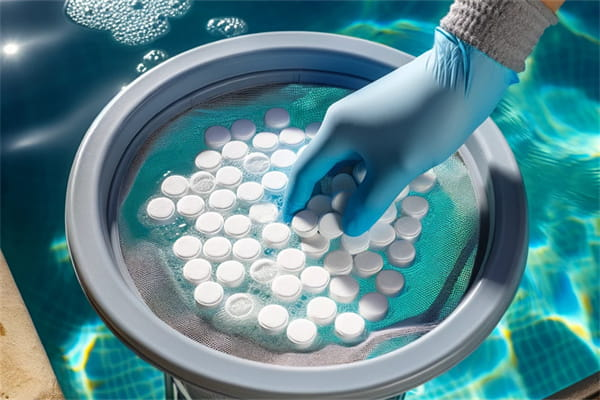In the world of pool maintenance, chlorine tablets have long been hailed as a cornerstone in ensuring crystal-clear and hygienic water. Their convenience, ease of use, and effectiveness in combating harmful microorganisms have made them a staple for both commercial and residential pool owners. However, as with any chemical-based solution, the question arises: are pool chlorine tablets truly a disinfection marvel, or do they harbor hidden threats that we should be mindful of?

I. Introduction: The Allure of Chlorine Tablets
First and foremost, let’s delve into the allure of pool chlorine tablets. They offer a streamlined approach to maintaining water quality, eliminating the need for constant monitoring and manual dosing of liquid chlorine. Simply by placing these tablets in a floating dispenser or skimmer basket, they gradually dissolve, releasing a steady stream of chlorine into the water. This automated process ensures that the pool remains sanitized, reducing the risk of bacterial and viral outbreaks that can compromise swimmer health.
II. Advantages: A Disinfection Marvel
1. Efficiency and Convenience:
The primary advantage of pool chlorine tablets lies in their convenience. No more mixing, measuring, or storing bulky containers of liquid chlorine. With tablets, pool owners can enjoy hassle-free maintenance while still maintaining optimal water clarity and hygiene.
2. Consistent Chlorination:
By releasing chlorine gradually over an extended period, tablets ensure a consistent level of sanitization throughout the pool. This prevents sudden spikes or dips in chlorine levels, which can lead to unpleasant odors, skin irritation, or even the growth of harmful organisms.
3. Cost-Effective:
Over the long run, chlorine tablets can be more cost-effective than other forms of pool sanitizers. Their concentrated formula means that less product is needed to achieve the same level of disinfection, saving pool owners money on both product costs and labor.
III. Potential Threats: Hidden Concerns
Despite their many advantages, pool chlorine tablets are not without their drawbacks. It’s crucial to recognize and address these potential threats to ensure the safety and well-being of all who use the pool.
1. Incorrect Dosage:
One of the biggest challenges with chlorine tablets is achieving the right dosage. If too many tablets are used, the water can become overly chlorinated, leading to irritation of the eyes, skin, and respiratory system. Conversely, too few tablets can result in inadequate disinfection, allowing harmful organisms to thrive.
2. Storage and Handling:
Chlorine tablets must be stored and handled with care to prevent accidental exposure. Exposure to skin, eyes, or clothing can cause severe irritation or even chemical burns. Additionally, improper disposal of spent tablets can pose environmental risks.
3. Byproducts of Chlorination:
Chlorination, while effective in killing pathogens, can also produce harmful byproducts such as chloramines and trihalomethanes. These compounds can contribute to unpleasant odors, eye and skin irritation, and may even increase the risk of respiratory problems. Regular pool shocking and filtration are essential to minimize these byproducts.
4. Impact on Equipment:
Prolonged exposure to high levels of chlorine can damage pool equipment, including pumps, filters, and liners. Regular maintenance and inspections are necessary to ensure that equipment is functioning properly and to prevent costly repairs or replacements.

IV. Balancing the Scales: Maximizing Benefits and Minimizing Risks
To harness the full potential of pool chlorine tablets while mitigating their risks, pool owners must adopt a proactive approach to pool maintenance.
1. Educate Yourself:
Understand the basics of pool chemistry and the proper use of chlorine tablets. Consult with pool professionals or refer to manufacturer guidelines for dosage recommendations and safety precautions.
2. Regular Testing:
Use a pool test kit to monitor chlorine levels and pH balance regularly. Adjust the dosage of chlorine tablets as needed to maintain optimal water quality.
3. Proper Storage and Handling:
Store chlorine tablets in a cool, dry place out of reach of children and pets. Always wear protective gloves and eyewear when handling the tablets.
4. Shock Treatment and Filtration:
Periodically shock the pool to break down chloramines and other harmful byproducts. Regularly backwash and clean your pool filter to remove debris and impurities.
5. Invest in Quality Equipment:
Choose high-quality pool equipment that is designed to withstand the rigors of chlorinated water. Regularly inspect and maintain your equipment to prevent costly breakdowns.
Conclusion
In conclusion, pool chlorine tablets are a powerful tool in the arsenal of pool maintenance, offering efficiency, convenience, and cost-effectiveness. However, their effectiveness is not without its limitations and potential risks. By understanding the benefits and drawbacks of chlorine tablets and adopting best practices for their use and storage, pool owners can maximize their benefits while minimizing the risks to swimmers, equipment, and the environment. With proper care and attention, pool chlorine tablets can indeed be a disinfection marvel that helps keep pools sparkling clean and safe for all to enjoy.

 Instant
Quote
Instant
Quote Email
Us
Email
Us